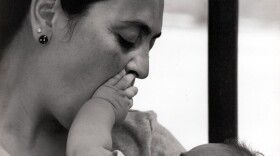The latest research shows a growing shortage of obstetricians and gynecologists, and the potential "crisis" this poses for women's health care. The shortage is so critical locally, Buffalo ranks No. 6 among U.S. metropolitan areas.
"I counsel and advise a lot of medical students who were thinking about OB/GYN and they still have this perception of OB/GYN as a very difficult lifestyle, and it scares people away."said Dr. Vanessa Barnabei, who chairs the Department of Obstetrics and Gynecology at the University at Buffalo's Medical School, which trains and recruits physicians.
In her 60s and with 35 years of experience, Barnabei is transitioning out of that position to concentrate on faculty development for the next three years, when she plans to retire.
A large number of her colleagues are also planning to hang up their white coat.
"What came out of that article is, when they look at the age of the physicians in the community, they're anticipating a significant phase of retirement in the next 5-10 years," Barnabei said.

The article she is referencing is a study by the Doximity network, which claims 70% of all U.S. physicians as members, including more than 43,000 full-time board-certified OB/GYNs.
"There's been a lot of discussion about ensuring that women have appropriate access to OB/GYN, but there actually hasn't been good, hard numbers on what those disparities look like across the country," said Christopher Whaley, who analyzed the numbers. "And so what we did in this study to help answer some of these questions was actually look at potential areas of shortages of OB/GYNs."
Whaley said the shortage facing Buffalo ranked the city No. 6 in the country, after the much larger cities of Las Vegas, Salt Lake City, Miami, Riverside, Calif., and Los Angeles.
"In Buffalo, we found that about 40% of OB/GYNs are above age 55," said Whaley, a policy research fellow at the RAND Corporation and professor at the University of California at Berkeley. "That's saying within a rough 10-year timeline, you may have 40% of the current OB/GYNs in Buffalo leaving the market due to retirement."
Whaley said the typical retirement age for OB/GYNs is younger than other doctors because of the demanding lifestyle.
"This is a particularly demanding specialty and there is more burnout than in other specialties," he said. "Maybe some of these work-life balance questions could be resolved simply by joining a larger practice or hospital or health system. The reality is, the baby's gonna come when it comes and you don't have a lot of control over your schedule, largely just because there's so much unpredictability."
If 40% of local OB/GYNs retire at one time, there will not be enough new doctors entering practice to fill the gap.
"The biggest pool of OB/GYNs we have is from our own (UB) training program," said Barnabei. "Right now, we train 8 per year. So we typically have 2-4 of those people staying in the community."
Add to that lower overall salaries than other specialities.

"Surgeons and other specialities do earn a lot more, so that's certainly something that could push smart and talented medical students to consider a different type of speciality path," Whaley said.
Plus already low reimbursement rates for OB/GYN services have not changed in years.
"I think what has to change structurally is the way we reimburse providers," said Barnabei. "OB care is set as a global fee, so no matter how many visits a patient has, no matter how much time you put into her care, you're only going to get paid the same amount."
With 30% of the population living in poverty, Barnabei said Buffalo women are already underserved compared to their suburban sisters.
"Women who live in the city, which is more of the underserved population, don't have the same access to a private OB/GYN as women in the community," she said. "Most of the big OB groups are in the suburbs, so either Amherst or Williamsville or Orchard Park. There is one large group in Snyder and they deliver mostly at Sisters Hospital (in Buffalo)."
The Kaleida and Catholic Health systems provide hospital groups in the city.
"It's good care, but it may not be equivalent to the care that you see in a private office, where you might see one provider the whole time, somebody who gets to know you," Barnabei said. "Plus (city women) is a very high-risk population, so it's a challenge taking care of these patients. They have obviously a lot of social and transportation problems and all that kind of stuff. So getting docs to take care of those patients is a challenge."
"The variations we highlight have real implications for patients and for women," Whaley said. "If you're in a market where OB/GYNs are overburdened and are working more than OB/GYNs in other cities, then there's a possibility that you as a patient may not get the same level or attention to care as women in other cities, or you might not get your best choice because that OB/GYN may be booked up."





